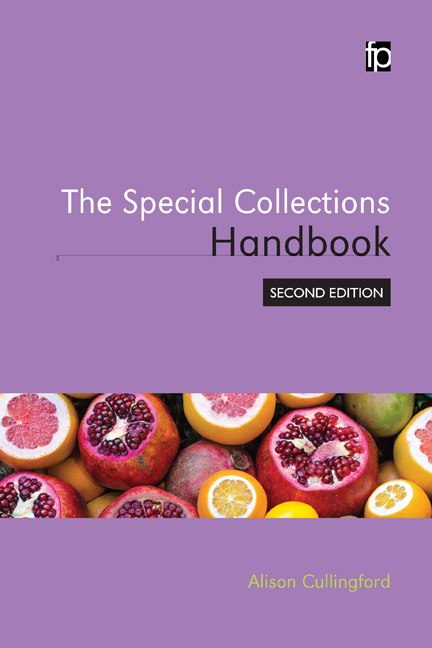Book contents
- Frontmatter
- Contents
- Preface and acknowledgements
- Introduction
- 1 The care of Special Collections
- 2 Emergency planning for Special Collections
- 3 Understanding objects in Special Collections
- 4 Acquiring and developing Special Collections
- 5 Cataloguing, description and metadata in Special Collections
- 6 Digitization and digital libraries in Special Collections
- 7 Legal and ethical issues in Special Collections
- 8 User services in Special Collections
- 9 Marketing and communications in Special Collections
- 10 Widening access to Special Collections
- 11 Organizational resources for Special Collections: space and people
- 12 Influencing and fund-raising for Special Collections
- Afterword: Special Collections futures
- Appendix A The Special Collections reference shelf
- Appendix B Skills for your Special Collections career
- Bibliography
- Index
12 - Influencing and fund-raising for Special Collections
- Frontmatter
- Contents
- Preface and acknowledgements
- Introduction
- 1 The care of Special Collections
- 2 Emergency planning for Special Collections
- 3 Understanding objects in Special Collections
- 4 Acquiring and developing Special Collections
- 5 Cataloguing, description and metadata in Special Collections
- 6 Digitization and digital libraries in Special Collections
- 7 Legal and ethical issues in Special Collections
- 8 User services in Special Collections
- 9 Marketing and communications in Special Collections
- 10 Widening access to Special Collections
- 11 Organizational resources for Special Collections: space and people
- 12 Influencing and fund-raising for Special Collections
- Afterword: Special Collections futures
- Appendix A The Special Collections reference shelf
- Appendix B Skills for your Special Collections career
- Bibliography
- Index
Summary
Introduction
Finally we consider fund-raising and influencing, without which none of the other Special Collections activities in this book would be possible.
This chapter will:
Introduce advocacy.
Discuss impact and metrics.
Introduce fund-raising and explain its importance.
Outline fund-raising issues.
Discuss sources of Special Collections funding: public programmes, trusts and foundations, individual giving, sponsorship and income generation.
Consider fund-raising strategy.
Introducing advocacy
The key challenge in special collections … is getting the broader institution to care. How does one ensure that the university and its stakeholders will be willing to underwrite the support of special collections … Expecting an appreciation of the intrinsic goodness of special collections won't carry the day even in well off, prestigious institutions.
Pritchard, (2012, 191)
A common problem for Special Collections especially in large organizations is that they do good work in the areas we have discussed, for example offering excellent services to their users, but their senior managers and other stakeholders are not aware of this or do not value their contribution. This puts the service at risk of cuts and other harm. To survive, let alone develop, Special Collections services need to maintain or enhance their share of central funding and other resources. Special Collections librarians need to shout about their achievements and excellence, about the positive contributions they make, in ways that will make sense to internal and influential audiences. This is known as advocacy. Advocacy is also about influencing external organizations and governments in relation to the sector. This process is sometimes called lobbying, especially when dealing with governments.
As with all marketing, advocacy entails finding out what matters to the audience and making sure they know you offer it, i.e. explaining Special Collections activities in language and ways that align with the organization's strategy.
While Special Collections face many threats, they are also in the most powerful position they have ever been. In universities, they offer ‘the equivalent of unique laboratory facilities that attract faculty and research projects’ (Pritchard, 2009): unique materials that are entwined with the story of the organization, unique selling points in a time when institutions must compete more than ever.
- Type
- Chapter
- Information
- The Special Collections Handbook , pp. 239 - 266Publisher: FacetPrint publication year: 2016



